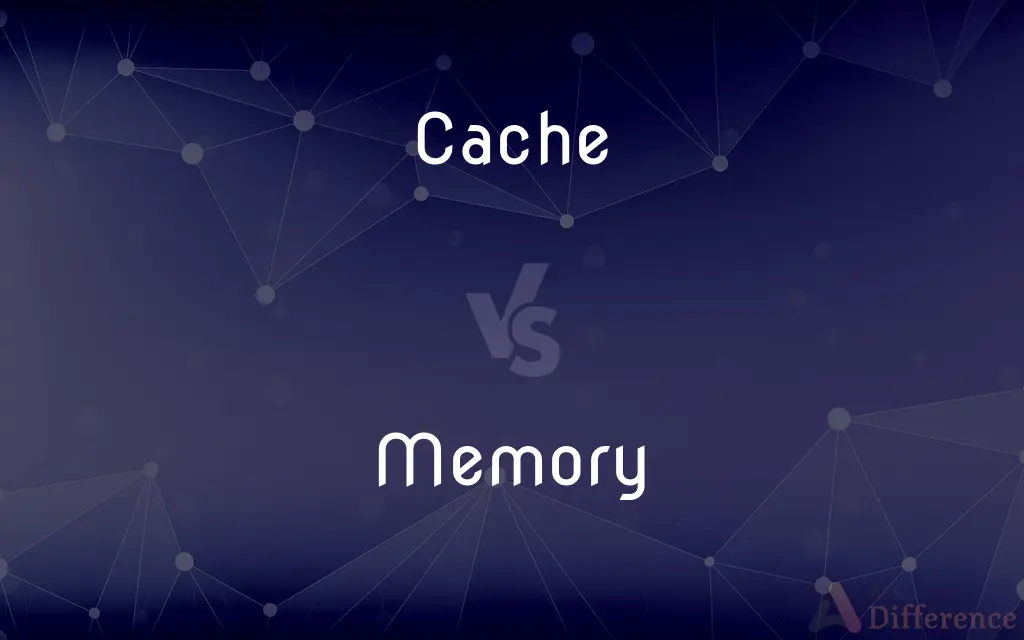Cache vs. Memory — What's the Difference?
By Tayyaba Rehman — Published on January 22, 2024
Cache is a small, fast storage area in a computer's CPU for temporary data access, while memory (RAM) is a larger storage space for data used by the computer during active tasks.

Difference Between Cache and Memory
Table of Contents
ADVERTISEMENT
Key Differences
Cache memory is a high-speed storage component in the CPU designed to hold frequently accessed data to speed up processing. In contrast, system memory, or RAM (Random Access Memory), is where the computer stores data currently being processed or used.
Cache has a smaller capacity but operates at higher speeds than RAM. RAM has a larger capacity and is slower compared to cache but faster than other storage like hard drives.
Data in the cache is transient and used for immediate processing needs, helping reduce the time to access frequently used data. Memory, on the other hand, holds data that the system actively uses but may not need instantaneously.
Cache memory is more expensive per byte than RAM due to its higher speed and closer proximity to the CPU. RAM is less expensive and provides a balance between speed and storage capacity.
The cache is critical for CPU performance, minimizing the delay in data retrieval. Memory is essential for multitasking and running applications, as it provides the workspace for the system's operations.
ADVERTISEMENT
Comparison Chart
Speed
Higher speed for immediate data access
Slower than cache, faster than hard drives
Capacity
Smaller capacity
Larger capacity
Purpose
Stores frequently accessed data temporarily
Stores data for current tasks
Cost
More expensive per byte
Less expensive per byte
Role in Processing
Reduces CPU access time
Provides workspace for active tasks
Compare with Definitions
Cache
Cache is a small, fast storage component in a CPU.
The processor's cache played a key role in speeding up the computation.
Memory
Memory (RAM) is a computer's primary storage for active tasks.
The computer used its RAM to run multiple applications simultaneously.
Cache
Cache minimizes the time to access data from the main memory.
Data retrieval was faster thanks to the efficient use of cache.
Memory
Memory provides a larger but slower storage compared to cache.
Though slower than cache, RAM is crucial for holding more data.
Cache
Cache stores frequently accessed data for quick access.
The cache temporarily holds the most used data to improve performance.
Memory
Memory stores data that is currently being processed.
The system's memory was almost full with running programs.
Cache
Cache has a much smaller storage capacity than RAM.
Despite its small size, the cache significantly boosts processing speed.
Memory
Memory is essential for a computer's multitasking capabilities.
Upgrading the computer's memory improved its multitasking performance.
Cache
Cache is critical for high-speed CPU operations.
Upgrading the CPU cache led to better overall system performance.
Memory
Memory is less expensive per byte than cache.
Expanding the system's memory was cost-effective for enhancing its capacity.
Cache
A form of memory in a computer which has a faster access time than most of main memory, and is usually used to store the most frequently accessed data in main memory during execution of a program.
Memory
A circuit or device that stores digital data.
Cache
(computer science) RAM memory that is set aside as a specialized buffer storage that is continually updated; used to optimize data transfers between system elements with different characteristics
Memory
Capacity for storing information
Two gigabytes of memory.
Memory
(computing) The part of a computer that stores variable executable code or data (RAM) or unalterable executable code or default data (ROM).
This data passes from the CPU to the memory.
Memory
An electronic memory device;
A memory and the CPU form the central part of a computer to which peripherals are attached
Common Curiosities
Can increasing cache size improve computer performance?
Yes, increasing cache size can improve performance by reducing data access times.
What is the main function of cache in a computer?
The main function of cache is to store frequently accessed data for quick access by the CPU.
Is it possible to upgrade the cache like memory (RAM)?
Cache is typically built into the CPU and not upgradeable, unlike RAM, which can often be expanded.
How does memory (RAM) differ from storage like hard drives?
RAM is much faster and stores data temporarily for active tasks, whereas hard drives store data permanently and are slower.
Can memory (RAM) speed affect overall computer performance?
Yes, faster RAM can improve the overall performance, especially in tasks requiring quick data access and processing.
Can the cache be cleared manually?
The CPU cache is managed automatically and does not require manual clearing.
How does cache affect a computer's processing speed?
A larger or faster cache can significantly speed up processing by reducing the time needed to access frequently used data.
How does a computer decide what to store in cache?
The CPU automatically stores frequently accessed data in cache to optimize performance.
Does having more memory (RAM) compensate for a smaller cache?
More RAM can improve performance, but it cannot fully compensate for a small cache due to the cache's higher speed.
What happens when a computer runs out of memory (RAM)?
When RAM is full, the computer may slow down or use disk storage as virtual memory, which is much slower.
Do all computers have both cache and memory (RAM)?
Yes, all modern computers are equipped with both cache and RAM, each serving different roles in data processing.
Why is memory (RAM) crucial for running applications?
RAM provides the necessary workspace for applications to run and store their data temporarily during operation.
What type of memory is more important for gaming?
Both cache and RAM are important; cache improves CPU performance while RAM allows for smooth running of games.
Is cache data retained when the computer is turned off?
No, cache is a type of volatile memory, meaning its data is lost when power is turned off.
What impacts more on multitasking, cache or memory (RAM)?
RAM has a greater impact on multitasking, as it determines how much data from active tasks can be held and accessed quickly.
Share Your Discovery

Previous Comparison
WLL vs. SWL
Next Comparison
Ohmic Conductors vs. Non-Ohmic ConductorsAuthor Spotlight
Written by
Tayyaba RehmanTayyaba Rehman is a distinguished writer, currently serving as a primary contributor to askdifference.com. As a researcher in semantics and etymology, Tayyaba's passion for the complexity of languages and their distinctions has found a perfect home on the platform. Tayyaba delves into the intricacies of language, distinguishing between commonly confused words and phrases, thereby providing clarity for readers worldwide.













































